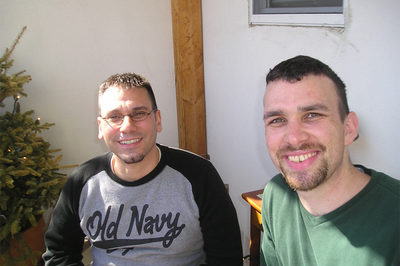Personal-care attendant Daniel L. Curcio doesn’t just care for his client, Yeremiah Hardt — he cares about him.
Curcio met Hardt about six years ago at an LGBT festival and quickly grew fond of him, and ultimately invited Hardt to move into his Center City apartment.
Hardt, 31, has been disabled since age 5, when he nearly drowned in a swimming pool.
“Basically, I’m with him 24/7,” Curcio said, noting that he prepares Hardt’s meals, assists with his physical and mental exercises, administers his medications, takes him to doctors’ visits and assists him with personal hygiene.
For the first four years of their relationship, Curcio received no compensation for his services — a situation that put a strain on the caretaker.
“I felt overly selfless,” said Curcio, 38.
In 2007, due to Curcio’s intervention, Hardt became eligible for medical-assistance funding through the state Department of Public Welfare, and Curcio now receives $80 per day to care for him.
Curcio calls the compensation “an insult, a slap in the face,” citing he also receives no healthcare benefits, sick leave or vacation.
But for a sizable settlement from his former employer in a job-discrimination grievance, Curcio said, he could never make ends meet.
“I’m barely scraping by,” he said.
Earlier this month, Curcio and Hardt addressed some 250 demonstrators at a rally to encourage Gov. Rendell to create a consumer workforce council that would negotiate with state officials to improve wages and benefits for Pennsylvania’s personal-care attendants.
Other states, including Massachusetts, New York and California, have formed similar councils. “Those states have programs that are working well and saving the state money,” Curcio said. “Why is our state so backward?”
If an attendants’ union is formed in Pennsylvania, Curcio said he would like to lead its LGBT caucus.
Chuck Ardo, a spokesperson for Rendell, said the governor is sympathetic to the activists’ goals.
“The governor agrees there should be better wages and benefits,” Ardo said. “He supports the council in principle. But there are impediments, and the administration is working with consumers, providers and funders to find a middle ground that all can agree to. We do understand the urgency and the necessity of the concerns.”
Hardt said that until Pennsylvania begins to value personal-care providers like Curcio, the commonwealth also is devaluing those who need the care.
“The government only listens when people unite,” Hardt said. “If we don’t form a union, the government will continue to ignore us. By paying Dan so little, the state is saying my life is worth little. We have to get organized, like the nursing homes are organized. But we don’t want to be in a nursing home. We want to be in the community. And we should be allowed to be.”
Charisse Seneres, organizing director of AFSCME Local 1199C, which represents more than 10,000 healthcare workers in Philadelphia, said her union is receptive to Hardt’s concerns.
“We support good jobs, with family-sustaining wages and health benefits for all workers,” Seneres said in a statement. “It’s exciting to see home-care consumers, seniors and their attendants stand up together for an initiative like the consumer workforce council that is a win-win for everyone. Home-care workers are largely invisible in our healthcare system. This is a chance for them to win a voice.”
But not everyone who attended last week’s rally wants a council.
Jesse G. Charles, 46, a quadriplegic from Lancaster, said a consumer workforce council would create more “red tape” within a system already burdened with bureaucracy.
“I can’t endorse the council, “ Charles told PGN. “It would bring another level of bureaucracy to the system. The budget for a council would be better used directly for the consumer.”
Charles said he recruits his own attendants, who are managed by United Disabilities Services, an agency based in Lancaster that he has utilized for 21 years. UDS offers healthcare benefits to its attendants who work full-time, he added.
“The agency also does state and federal checks to make sure my attendants are screened properly,” he said. “I have no complaints.”
Curcio said elderly and disabled individuals who use personal-care attendants would have a majority representation on the council, that way they could ensure any changes made to the system are consumer-driven and in their best interests.
“Remember, a union will only form when there’s a consumer workforce council in place to ensure that consumers’ voices are given the utmost priority in any negotiations that take place with the state,” he said.
A public hearing to discuss the proposed council will be held at 9:30 a.m. April 28 in Hearing Room One of the Capitol Building in Harrisburg.
“The reason for the hearing is to learn more about the concept of the council,” said Amy P. Bolze, executive director of the state Senate Committee on Aging and Youth. “We’re hearing from advocates and opponents, and we’re trying to sort it all out.”
Tim Cwiek can be reached at (215) 625-8501 ext. 208.
